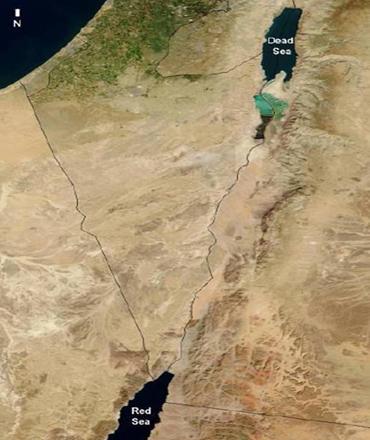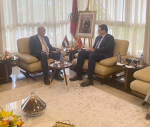You are here
French-Jordanian forum discusses water sustainability
By Laila Azzeh - Oct 17,2016 - Last updated at Oct 17,2016
AMMAN — Although water remains one of the most pressing issues facing Jordan today, international funds focus on short-term humanitarian assistance, according to the Water and Irrigation Ministry.
While the pressure on water resources has increased by 21 per cent since the influx of Syrian refugees began, the water infrastructure has not been rehabilitated to meet the growing population.
“For example, in Mafraq — where the ratio of Jordanians to Syrians is 61 per cent — the coverage of sewage systems only stands at 30 per cent,” said Salameh Mahasneh from the Water Ministry.
He made his remarks at the Second Franco Jordanian Forum on Water Sustainability on Monday, a one-day gathering that brought together experts, officials and representatives of French water companies to discuss pressing issues related to water in Jordan and the region.
The event was organised by the French Chamber of Commerce and Industry in Jordan in cooperation with the French Agency for Development and the Jordan Construction Contractors Association.
In his opening remarks, Water Minister Hazem Nasser highlighted the ministry’s plans in cooperation with its partners to reduce water loss and ration energy consumption by increasing dependency on renewable energy in water facilities.
“We are also working to increase support channelled to the water sector in order to implement schemes that help Jordan deal with the pressure of the Syrian refugee crisis,” he said.
Nasser also cited the ministry’s national water strategy, which seeks to reduce water loss by 30 per cent by 2025.
The minister commended France for its efforts to improve Jordan’s water capabilities in terms of rehabilitation, saying that the country’s support to the water sector exceeded 200 million euros in the past years (around JD156 million).
Furthermore, French investment in the water sector reached $500 million over the last 15 years, he said.
French Ambassador to Jordan David Bertolotti underlined the need to help Jordan overcome its water challenges, stressing that the importance of the forum in discussing ways to enhance water sustainability.
Participants in a panel that tackled Jordan’s response to the Syrian crisis in terms of water supply and management agreed on the need to revisit water management strategies, while increasing the efficiency of water resources.
“We should also think outside the box and seek trans-border water agreements with neighbouring Arab countries. A regional water share might be the best answer to water challenges,” said Elias Salameh, a professor at the University of Jordan.
On the other hand, Nabil Zu’bi, the director of the Red Sea-Dead Sea Water Conveyance (Red-Dead) Project at the Water Ministry, presented a briefing on the scheme.
The project, part of a regional water sharing initiative between Jordan, the Palestinian Authority and Israel, aims to produce desalinated water from the Red Sea to be sold to Israel and Jordan, while releasing Israel’s water from Lake Tiberias for sale to Jordan.
The Red-Dead project comprises an intake facility and desalination plant near the Red Sea, and a brine pipeline connecting the desalination plant to the Dead Sea.
“The ministry will announce the names of the prequalification candidates [to construct the project] in early November,” Zu’bi noted.
Jordan signed a memorandum of understanding with Israel and Palestine in December 2013 to implement the first phase of the Red-Dead project.
Palestine will receive 30mcm of freshwater to cover its water deficit, according to the memo, while Israel will buy its share of 50mcm of desalinated water from the project at cost value and sell Jordan the same amount of water in the northern Jordan Valley at a cost of JD0.27 per cubic metre.
The first phase of construction is planned to start next year, according to the ministry, which said that under the first phase, a total of 300mcm of water will be pumped each year.
In its following phases, the Red-Dead project entails transferring up to 2 billion cubic metres of seawater from the Red Sea to the Dead Sea annually, according to the ministry.
A total of 85-100mcm of water will be desalinated annually, while the seawater will be pumped out from an intake located in the north of the Gulf of Aqaba.
Related Articles
AMMAN — The Water Ministry on Sunday signed the engineering services agreement for the first phase of the Red Sea-Dead Sea Water Conveyance
AMMAN — The Red Sea-Dead Sea Water Conveyance Project is still on the agenda, despite Israeli procrastination, Prime Minister Omar Razzaz sa
AMMAN — The Ministry of Water and Irrigation has modified the final submission date of the prequalification proposals for the first phase of

















